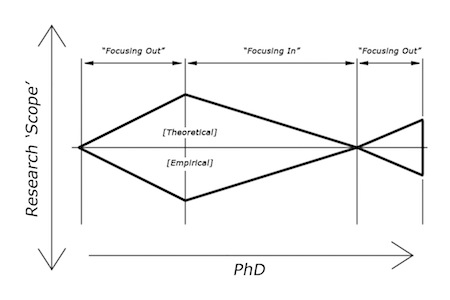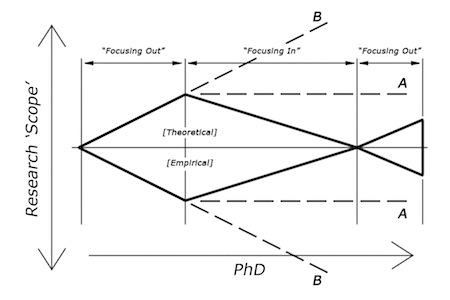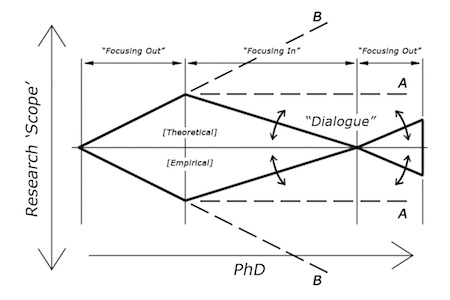During my workshop at the Research Practices 2.0 event on Saturday, we discussed some of the fundamental questions about sharing work online.
What?
- What type of research work / activities / content etc?
Where?
- What type of social media / online spaces?
When?
- During what stages of PhD / study / project?
- How might this support / compromise ‘formal’ dissemination?
How?
- What types of format / media etc.
Who (to/with)?
- Audience – size, demographic?
- Identifiability – real or ‘imagined’?
I had a great group, who were not given anywhere near the time they deserved to discuss these sufficiently. But they responded brilliantly, generally embracing the idea of research dissemination beyond text-based formats and reporting of findings.
In following up these questions – particularly the ‘What?’ and the ‘When?’ – I referred to my interpretation of Jakob Bardram’s (2007) Fish Model. This plots the student’s engagement in theoretical and empirical work (which I crudely termed the ‘Research Scope’) with the duration of the PhD.

This highly conceptual model is hardly an authentic representation of anyone’s actual PhD, but it does usefully indicate at-a-glance the broad ‘focusing out’ and ‘focussing in’ periods that commonly describe the doctoral research trajectory.
I extended this model to incorporate how, as PhD students; we might at least maintain the scope of academic engagement and learning expansion (represented by A). Indeed, there is justifiably an argument to go beyond a process of mere sustainability in favour of a continuation of the ‘focusing out’ trajectory (as represented by B). Or, crucially, do we relinquish the agency for continued expansive learning to adopt a ‘blinkered’ approach that conforms to the reductionist constraints of ‘finishing the thesis’ without compromising direct disclosure of ideas or findings before ‘formal’ publication.

Holistic models of doctoral practices provide more authentic representations of what doing a PhD actually entails, and the complex socio-educational structures that underpin it – what Cumming (2010) refers to as ‘doctoral enterprise’. Such approaches incorporate activities, forms of intellectual enquiry and social interaction beyond those parameters defining thesis-development, to those that are more attributable to exploring the general research field, and engaging in multiple practice contexts.
For the purposes of the workshop, this was a simple way of demonstrating the ‘dialogical’ relationship between what McAlpine et al. (2009) distinguish as the ‘doctoral-specific’ and the ‘academic-general,’ which describes the potential interrelatedness and influence between the core and the peripheral.

This blog post itself partly represents an example of such a dialogue. It references an event and a project, which can be seen as peripheral activities not directly linked to my PhD research. However, my activities in the project have (not surprisingly) been informed by my research into doctoral practices and social media. Additionally, I may chose not to reference Bardram’s Fish Model in my thesis, but some of the conceptual ideas it has helped describe will be explored. Articulating these ideas in this way is contributing to my process of understanding and conceptualising that will benefit my thesis.
Similar dialogical processes between thesis-development and peripheral activities (such as teaching) may not necessarily involve social media. But it’s taken me a while to realise in my own PhD research, that it is fundamentally the nature of this dialogue – which is social, contested and in a state of flux – that is key to understanding the cultural aspects of social media adoption and use.
References
Bardram, J. E. (2007). The Art of Doing a PhD. Doctoral Colloquium. UbiComp 2007. Innsbruck, Austria.
Cumming, J. (2010). Doctoral enterprise: A holistic conception of evolving practices and arrangements. Studies in Higher Education, 35(1), 25-39.
McAlpine, L., Jazvac-Martek, M., & Hopwood, N. (2009). Doctoral student experience: Activities and difficulties influencing identity development. International Journal for Researcher Development, 1(1). 97-109.




